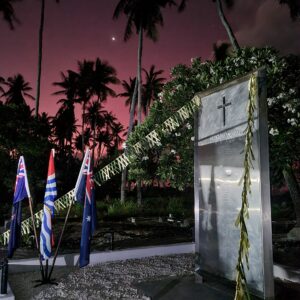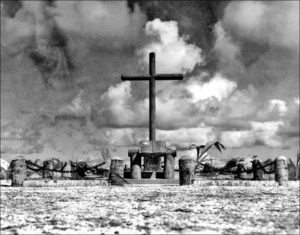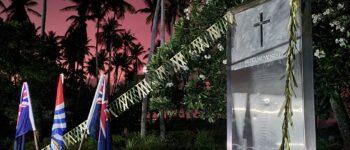1942: Tarawa Massacre
October 15, 2022
By AHNZ

Today in history, 15 October, 1942, seventeen captured New Zealand Prisoners of War and five civilians were beheaded by their captors. They were the first Japanese prisoners of war from New Zealand and several did not even know they were soldiers.
To keep watch on the Germans sixty two little Coastwatch Units were set up around the Pacific. It was a civilian job with army oversight that started off as a fairly safe and relaxed adventure. This changed suddenly after Japan’s entry to The War. After the Pearl Harbour attack the Japanese pounced on the Coastwatcher islands, taking the New Zealanders prisoner. Our Government impressed the civilians into military service after the fact.
Many Coastwatchers were taken back to Japan but 17 were held at Betio, Tarawa atoll, Gilbert Islands (Kiribati,) where they were executed by beheading. There was no help for these men who had gotten in deeper than they ever expected to in the service of New Zealand. Being taken prisoner by a German was one thing but the Japanese turned out to have a far more dehumanising outlook.
“The civilian coastwatchers were retrospectively given military rank in 1944 so that their dependants could claim pensions and other rights.” – New Zealand coastwatchers executed by the Japanese, NZ History.gov
“After Pearl Harbour and the start of the Japanese war, New Zealand left the men on the atolls, making no attempt to bring them to safety. Unknown to the radio operators, back in Wellington they were secretly attested into the New Zealand Army. It was feared the Japanese would execute them as civilian spies.” – Last Coast Watcher remembers, Stuff (2012)
“For reasons far from clear, the Japanese beheaded all of them. They had all been tied up to coconut trees in front of Commander Keisuke Matsuo house on Betio.” – ibid
“Adventurous applicants could expect an off-shore job of only a few months duration in an exotic location; a location where a person would not expect to become trapped in a war zone. Sixty-two Coastwatch Units were established on various islands throughout the Pacific. Coastwatchers worked in difficult conditions without access to important tools such as binoculars or aircraft and naval recognition charts.” – NZ H&NH, Facebook (2019)
 The reason for the massacre remains uncertain. It may have been that the Japanese Commander was drunk that day. He had the POWs tied to coconut trees in front of his house before ordering their heads chopped off. It is also reported that the Americans had made an air raid prior to the massacre that may have provoked the executions.
The reason for the massacre remains uncertain. It may have been that the Japanese Commander was drunk that day. He had the POWs tied to coconut trees in front of his house before ordering their heads chopped off. It is also reported that the Americans had made an air raid prior to the massacre that may have provoked the executions.
A year after the massacre the Americans came to the ‘rescue’ in the 3 day Battle of Tarawa. A force of 6000 Japanese were torn to pieces. There are still large amounts of heavy metal wreckage strewn about the island. American human remains are discovered and repatriated to this day but as yet no sign of the New Zealanders has been proven.
In 1944 United States Marines erected a memorial to seventeen New Zealand coast-watchers and five civilians who were captured (image, right.)
Today there is a dented steel memorial (image, above.) It remembers men who were poorly treated by our Government by being given a dangerous job on false pretenses. They were not supported in that job and were left behind to die when the situation became kinetic. Even in death they were left in the lurch so as not to upset the enemy and their story is seldom told.
—
Image ref. Tarawa Massacre Memorial, April 2022. New Zealand High Commission Tarawa, Kiribati; Facebook (2022)
Image ref. Marines Memorial to the Kiwis; NZ History.govt
2 thoughts on "1942: Tarawa Massacre"
Leave a Reply
 Like Comment Share
Like Comment Share






I suspect similar atrocities like the one you describe are being committed every day as war rages around the world on a never ending cycle.
My Mums younger brother was killed in action during the Solomon Islands Campaign 1943.
She hated the Japanese until the day she died. There was always a festive air around home when August 6th arrived every year.
It could end if people would give up Statism